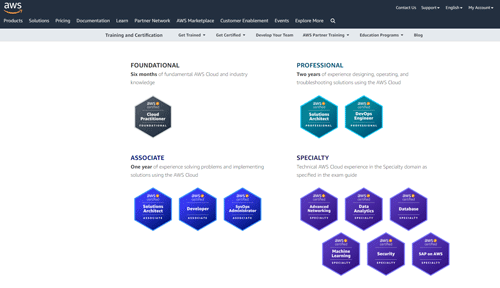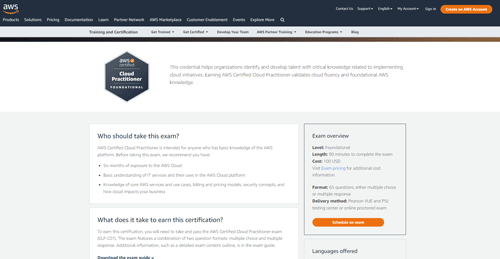AWS Step-by-Step
What You Need to Know About AWS Certification, Part 1
Amazon Web Services certifications are among the IT industry's most sought-after. Here's what it takes to get AWS-certified.
Amazon Web Services (AWS) certifications are among the IT industry's most sought-after. Like so many other technology companies, however, Amazon offers several different certification paths with varying requirements.
In this two-part series, I want to talk about what it takes to get AWS-certified. In Part 1, I am going to discuss the various certifications that are available. I will then wrap things up in Part 2 by talking about some of the resources that can help you through the certification process.
Amazon currently offers 12 different AWS certifications. The interesting thing about Amazon's approach to the certification process is that certifications are tied to both skills and to experience levels. Amazon certifications fall into one of four categories, shown in the figure below.
 [Click on image for larger view.]
[Click on image for larger view.]
The first of these categories is Foundational. This is Amazon's introductory-level certification and is intended for those who have been working with the AWS cloud for six months. Right now, the only certification that you can get at the foundational level is the Amazon Certified Cloud Practitioner certification. This particular certification revolves around some of the AWS core services, as well as things like billing and pricing models and security concepts. Because this is a foundational-level exam, Amazon has defined several things as being outside of its scope. For example, those who take the Certified Cloud Practitioner certification exam are not expected to know how to write code, perform migrations, or perform load and performance testing (this is a partial list).
The exam for the Cloud Practitioner certification consists of 65 questions which must be answered in 90 minutes. The exam costs $100. You can see some of the exam details in Figure 2. Incidentally, this format is not consistent across the entire library of AWS certification exams. The exams are of varying lengths and the cost for taking an exam varies based on the exam type.
 [Click on image for larger view.]
[Click on image for larger view.]
The next certification category is called Associate. An associate-level certification is geared toward those who have one year of experience with the AWS cloud and have some experience with troubleshooting and implementing solutions. There are three different certifications that fall into the Associate category: AWS Certified Solutions Architect, AWS Certified Developer, and AWS Certified SysOps Administrator. As you can see, each of these certifications is geared toward a different job role. It is also worth noting that unlike some of the other text certifications, Amazon only requires you to pass a single exam to earn one of the certifications.
The third AWS certification category is called Professional. Professional-level certifications are intended for IT professionals who have at least two years of experience working with the AWS cloud. Those who are taking a professional-level exam are expected to know how to design, operate and troubleshoot solutions within the AWS ecosystem.
There are two certifications that currently exist at the Professional level. The first of these certifications is the AWS Certified Solutions Architect certification. It is geared toward those who have hands-on experience with designing and implementing cloud architecture on AWS. On a side note, Amazon is going to be making some changes to this particular certification toward the end of the year.
The other professional-level certification is the AWS Certified DevOps Engineer certification. Whereas the AWS Certified Solutions Architect certification focuses more on designing cloud architecture, the DevOps Engineer certification is more about provisioning resources within the AWS cloud. The exam also places a heavy emphasis on managing those resources.
The fourth certification level is called Specialty. Specialty certifications have less to do with years of experience and job role than the other certification categories. Instead, specialty certifications are meant to demonstrate technical proficiency in a specific area. Right now, Amazon offers six specialty certifications. These include: AWS Certified Advanced Networking, AWS Certified Data Analytics, AWS Certified Database, AWS Certified Machine Learning, AWS Certified Security, and AWS Certified SAP on AWS.
Even though specialty certifications are not categorized in the same way as Cloud Practitioner-, Associate- or Professional-level certifications, the certifications do assume that you have a considerable amount of experience with the subject matter. For example, the AWS Certified SAP on AWS exam is intended for those who have five or more years of SAP experience.
Now that I have discussed the various certification paths, I want to turn my attention to some resources that can help you to prepare for a certification exam. I will discuss several such resources in Part 2 of this series.
About the Author
Brien Posey is a 22-time Microsoft MVP with decades of IT experience. As a freelance writer, Posey has written thousands of articles and contributed to several dozen books on a wide variety of IT topics. Prior to going freelance, Posey was a CIO for a national chain of hospitals and health care facilities. He has also served as a network administrator for some of the country's largest insurance companies and for the Department of Defense at Fort Knox. In addition to his continued work in IT, Posey has spent the last several years actively training as a commercial scientist-astronaut candidate in preparation to fly on a mission to study polar mesospheric clouds from space. You can follow his spaceflight training on his Web site.